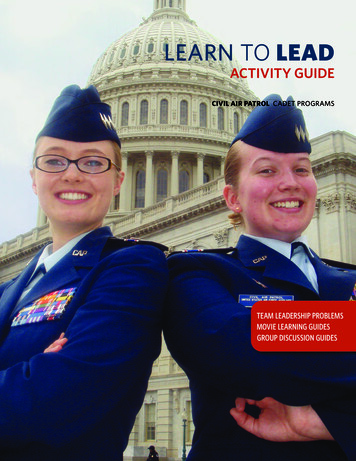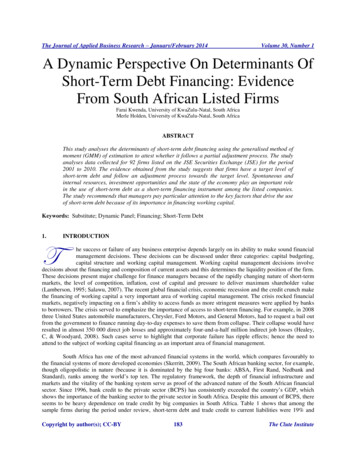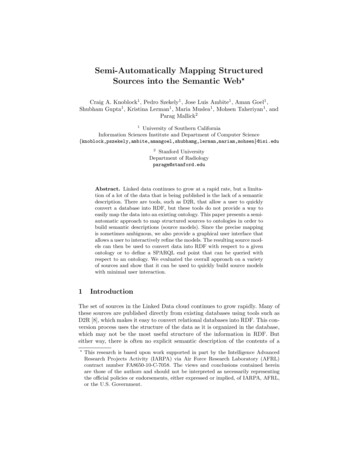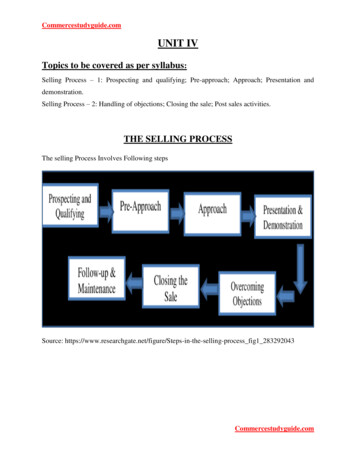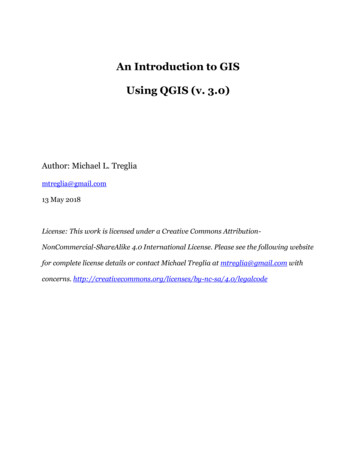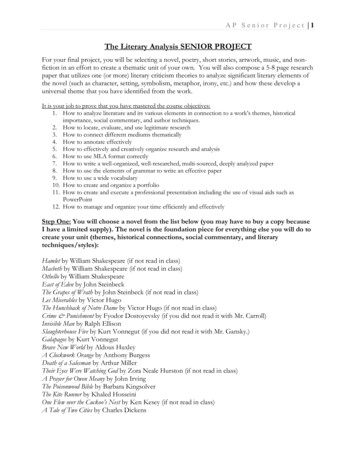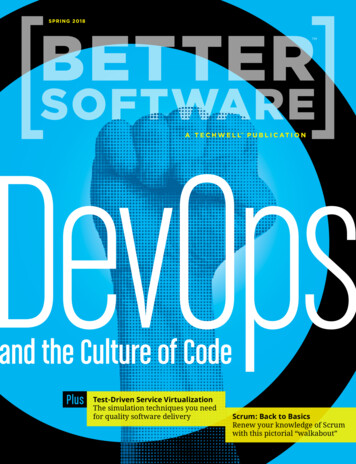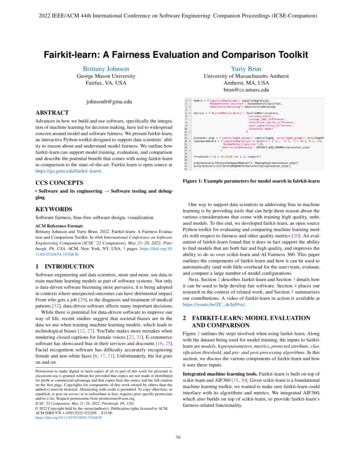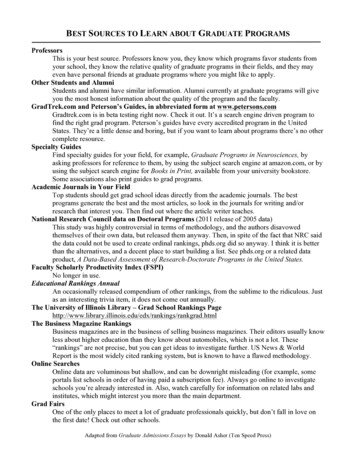
Transcription
BEST SOURCES TO LEARN ABOUT GRADUATE PROGRAMSProfessorsThis is your best source. Professors know you, they know which programs favor students fromyour school, they know the relative quality of graduate programs in their fields, and they mayeven have personal friends at graduate programs where you might like to apply.Other Students and AlumniStudents and alumni have similar information. Alumni currently at graduate programs will giveyou the most honest information about the quality of the program and the faculty.GradTrek.com and Peterson’s Guides, in abbreviated form at www.petersons.comGradtrek.com is in beta testing right now. Check it out. It’s a search engine driven program tofind the right grad program. Peterson’s guides have every accredited program in the UnitedStates. They’re a little dense and boring, but if you want to learn about programs there’s no othercomplete resource.Specialty GuidesFind specialty guides for your field, for example, Graduate Programs in Neurosciences, byasking professors for reference to them, by using the subject search engine at amazon.com, or byusing the subject search engine for Books in Print, available from your university bookstore.Some associations also print guides to grad programs.Academic Journals in Your FieldTop students should get grad school ideas directly from the academic journals. The bestprograms generate the best and the most articles, so look in the journals for writing and/orresearch that interest you. Then find out where the article writer teaches.National Research Council data on Doctoral Programs (2011 release of 2005 data)This study was highly controversial in terms of methodology, and the authors disavowedthemselves of their own data, but released them anyway. Then, in spite of the fact that NRC saidthe data could not be used to create ordinal rankings, phds.org did so anyway. I think it is betterthan the alternatives, and a decent place to start building a list. See phds.org or a related dataproduct, A Data-Based Assessment of Research-Doctorate Programs in the United States.Faculty Scholarly Productivity Index (FSPI)No longer in use.Educational Rankings AnnualAn occasionally released compendium of other rankings, from the sublime to the ridiculous. Justas an interesting trivia item, it does not come out annually.The University of Illinois Library – Grad School Rankings ankgrad.htmlThe Business Magazine RankingsBusiness magazines are in the business of selling business magazines. Their editors usually knowless about higher education than they know about automobiles, which is not a lot. These“rankings” are not precise, but you can get ideas to investigate further. US News & WorldReport is the most widely cited ranking system, but is known to have a flawed methodology.Online SearchesOnline data are voluminous but shallow, and can be downright misleading (for example, someportals list schools in order of having paid a subscription fee). Always go online to investigateschools you’re already interested in. Also, watch carefully for information on related labs andinstitutes, which might interest you more than the main department.Grad FairsOne of the only places to meet a lot of graduate professionals quickly, but don’t fall in love onthe first date! Check out other schools.Adapted from Graduate Admissions Essays by Donald Asher (Ten Speed Press)
Writing Exercisesfor theGraduate Admissions Essay, Statement of Purpose, or Letter of IntentAnswer each question with a narrative essay of any length, from a paragraph to several pages, whateverfeels right.1.2.3.4.5.6.7.8.9.10.11.12.13.14.15.16.How did you first get interested in this field of study? Can you remember the very first timeyou had this interest?What has influenced this interest over time? What professors, classes, labs, papers, researchprojects, books or ideas have influenced you? What out-of-class experiences have influencedyou?If your interest has changed over time, how has your prior interest contributed to yourunderstanding of/approach to your current interest?Make a list of all your undergraduate papers, labs, and research projects. If you cannotremember their exact names, approximate or paraphrase.Do you have any publications or presentations at academic conferences? Are therepublications you can submit or any academic conferences you can attend (in any capacity)between now and when you would begin your graduate studies?What will you do between now and when you will arrive at your graduate institution? Whichclasses will you take? What skills will you acquire? What internship, work or communityservice experiences will you complete?How have you researched your graduate school options to date? Have you visited schools,researched them on Web sites, written to professors, attended conferences?Can you remember encouraging words you have received from professors, employers,coaches, or peers? If others have encouraged you to pursue your goals, can you remember, asexactly as you can, what they said to you? If so, make a list of quotes.What is your GPA in the following categories: overall, year by year, over the last fourcompleted semesters, in your major, since you declared your current major, in math andsciences, not counting math and sciences, not counting semesters abroad, etc.? Look at yourtranscripts and see if there are other ways of analyzing your GPA that might be of interest toadmissions readers.How have you prepared yourself for success in graduate school? What body of relevantknowledge will you take with you? What study or laboratory skills will help you succeed?What personal attributes will help you?Have you overcome adversity to get where you are? (Be brief.)What makes you unique or unusual? List several things.What are your leisure activities? What do you do when you are not being a student? What doyou do to relieve stress?How might you contribute to the academic community you intend to join? How will thatcommunity be benefited by association with you?Can you name specific professors of interest at your top three graduate programs? If so, listthem along with their research/academic specialties.What will you do with this degree? Will you teach, do research, work in industry orgovernment? All of the above? (If you don’t know, don’t invent.)This handout courtesy of Donald Asher, adapted from Graduate Admissions Essays (Ten Speed Press), the best-selling guide to thegraduate admissions process. See Graduate Admissions Essays for sample essays in all fields.
Questions to ask any graduate program:1.2.3.4.5.6.7.8.9.10.11.12.13.14.15.What are the strongest areas in the department? Which areas areexperiencing growth in research success and publications?What is the largest and the most typical class size for a graduate class?Are classes restricted to graduate students or are undergraduatescommon in your graduate classes?What would be the advantages and disadvantages of going to gradschool immediately after completing the undergraduate program? Theadvantages and disadvantages of waiting a few years? The best use ofthe interim time?What are the criteria and process for selecting teaching assistants,research assistants, and fellows?I will probably need financial assistance. Can you tell me how moststudents fund their studies here?Will I get to develop my own topics, or will I be expected to work on aprofessor’s ongoing research?What is the mean time to complete (a) class work, (b) research,(c) thesis or dissertation (if required)? (I.e., what is the mean time tocomplete the entire program? Ask about the program as a whole, butperhaps more importantly, by advisor/mentor/professor.)What is your attrition rate? Of those who don’t finish, what are theirreasons?What kind of student thrives in your program?How reliable is your financial support year to year? Is the first-yearoffer always sustained given attainment of academic goals?What is the age, race, gender balance, ratio of married/single, andgeographical origin of graduate students in the program? (In otherwords: Are there any other people like me?)I have compiled bibliographies of publications by your faculty off theirweb sites and my own research, but can you tell me which have wonawards and grants lately (and presumably need graduate assistants)?Can you tell me about your placement rates and types of jobs obtainedby recent graduates? (Avoid relying on testimonials and anecdotalevidence.)May I meet some currently enrolled students (in person or via phone,Skype, or email)? (Be sure to ask about their research topics and be sureto take notes on specific profs mentioned.)How can I be a strong candidate for a program like this?Adapted from Graduate Admissions Essays by Donald Asher (Ten Speed Press)www.amazon.comDonald Asher, Asher Associates, 415-543-7130, don@donaldasher.com
Ten Things to Do if You Don’t Get In1.2.3.4.5.6.7.8.9.10.Apply earlier (avoid the last six weeks before the deadline).Apply to more schools (six is usually considered a prudentminimum: two schools that are likely to admit you, twomiddle-of-the-road schools, two reach schools).Apply to more safe schools (even 4.0 students can and do getrejected).Visit and wow ‘em (be sure to follow Asher’s Law).Go to summer school in the targeted subject and wow ‘em (it’seasy to get into summer school, even at Harvard).Take one class at a time in the targeted subject and wow ‘em(remember: your most recent grades count the most).Get volunteer or internship experiences in the targeted field(even part-time, even unpaid).Work in a “real job” in the targeted field (there’s no substitutefor actual experience, and recommendations from supervisorsin the profession).Get an intermediate degree (such as a master’s or even just acredential).Get older and try again (many times, that’s all it takes).Don’t forget that the best time to apply is early in the fallto start graduate school the following fall, sobe sure to plan ahead!Asher’s Law: Thou shalt not write, nor call, nor visit any graduatefaculty member without having read some of his or her works first.Adapted from Graduate Admissions Essays by Donald Asher (Ten Speed Press), www.amazon.com.Donald Asher, Asher Associates, 415-543-7130 or don@donaldasher.com.
Why you need to apply earlyand to several programs:(these are actual cases) One student was rejected because her printed-out application portfolio was“accidentally placed on the wrong pile.” The graduate school discovered itsmistake later in the season, but had already sent the student a rejection notice.Rather than admit what had happened, they let the decision stand. A student applying for a PhD in philosophy received a letter from a majoruniversity rejecting his application for a PhD in Germanic languages. A student was rejected by an internationally acclaimed architecture programafter his portfolio was reviewed by Prof. X. When he called to inquire aboutthe status of his application, Prof. Y picked up his portfolio, glanced through itwhile the student was on hold, and reversed the decision of Prof X. Thus washe admitted. One professor forgot to submit a wonderful letter of recommendation he hadwritten for his favorite advisee, and she was rejected. Another professor was not granted tenure, and stopped performing all dutieswhatsoever that were not contractually required. This included writing lettersof recommendation that he had already agreed to write. At least one of hisadvisees was not admitted to a graduate program because of this. The studentnever knew what happened. A student failed to send original transcripts from a community college sheattended while in high school. The transfer grades from the community collegeappeared on her regular college transcript but—through a bizarre chain ofevents—an overzealous student employee and a 50 cent library fine from sixyears prior conspired to keep her out of graduate school. A student had a wonderful exchange of emails with a department chair, someof which included such statements as “We’re so delighted that you will bejoining us next year.” Nevertheless, she was rejected by the graduate schooloffice, which had more authority than the department.Adapted from Graduate Admissions Essays by Donald Asher, don@donaldasher.com or www.amazon.com
Statement of Purpose Pre-Writing Exercise:Build a Table of Undergraduate Research ProjectsSuggestions:-list projects in order of interest to your targeted reader-use working titles to describe your research projects-name your professor/advisor/supervisorSample Undergraduate Research ProjectsDesigned original research into the ultrafiltration of proteins, includingdeveloping a theoretical model for design, design and actual prototyping ofcross-flow ultrafiltration unit, and experimentation to determine optimalsettings for maximal permeate flux. A Biochemical Engineering Laboratorysenior project under the direction of Prof. L. Hintzer.Designed a stream remediation project involving liquid-liquid extraction toremove m-xylene from contaminated water; also used EPA QUAL2E to modelthe effects of DO, BOD, and Nitrogen cycle, under the guidance of Prof. L.Hintzer.Conducted research into mathematical models of potential use for codifyingchaotic systems such as watersheds, an independent study under NSF grantsupervised by Prof. P. Cenczynksy. Abstract and draft findings available athttp://www.HarveyMudd.edu/ czynsky/models2.html.Designed and conducted original research into quantitative and qualitativeproperties of a meteorite sample using atomic absorption spectrophotometry,emission spectrophotometry, and induction coupled plasma and laserspectrophotometry under the direction of Prof. R. Hull-Wallace. Resultspresented at the Argonne National Laboratory during annual meeting of theInternational Association of Amateur Astronomers, 2014.This is not just for science students! Similar descriptions can be written about papers and projects in the liberal artsand other fields, e.g., “Designed and conducted an in-depth analysis of the use of lightness and darkness to conveymoral authority in Elizabethan poetry of Smyth, Hallbeck, and Colbin, resulting in a 28-page paper presented insummary to the Anderson College English Department Colloquium, Nov. 1st, 2013.”Adapted from Graduate Admissions Essays by Donald Asher (Ten Speed Press)don@donaldasher.com or www.amazon.com
Funding Graduate StudyA PrimerThis is a free, open-source resource by Donald Asher, author of the best-selling guide to getting into graduate school,Graduate Admissions Essays, 4th ed., 2012. You are welcome to share this with all your friends, students, faculty, staff,etc., and you may post this anywhere in any format in any medium. Also, alert me to cool resources (email below).***Email me and I will send you an article on how to fund your graduate studies: don@donaldasher.comUse my book, The Best Scholarships for the Best Students, by Donald Asher, Jason Morris, and Nichole Fazio-Veigel(which includes elite internships and lab opportunities in addition to funding, all the way to postdoc)Avoid using the term “financial aid,” but instead inquire about “funding and support.” Many (but not all) programshave teaching, research, and graduate assistantships, so you can ask them some version of this: “When and how doyou choose your TAs, RAs, and GAs, and can you help me understand all the forms of funding and support availableto students in your program?” They may say, “It’s all on our web site,” so you’d better have looked carefully on theweb site first.Also, check out these books & web sites:UCLA’s Graduate & Postdoctoral Extramural Support (GRAPES) Database, available atwww.grad.ucla.edu/grpinst.htm (fantastic open resource; yay, UCLA!)University of California-Santa Cruz (UCSC): Fellowships & Funding Guide for Graduate Students, available ding the Humanities PhD: The Grad Student's Guide to Grants & Fellowships [Kindle Edition], by J. Martin,PhD, available from amazon.com for 3.99 (this is an excellent guide in an area that doesn’t get enough attention, i.e.,funding for humanities; highly recommended)Foundation Grants to Individuals, by Foundation Center (various authors; annual)Annual Register of Grant Support, by Beverley McDonough and Daniel Bazikian (annual, obviously, hence thename)Finaid.orgFastweb.comFAFSA: www.fafsa.comGrants.gov ( 500 billion in funding)NIH: grants.nih.gov/grants/oer:htmNSF: nsf.gov/fundingNASA: intern.nasa.gov/solar/web/public/main (SOLAR is Student On-Line Application for Recruiting)COS: pivot.cos.com (Community of Science)(these are just the most important; for hundreds of specialized sites, for underrepresented students, forinternational students, STEM only, etc., see The Best Scholarships for the Best Students)
Letters of RecommendationThis is a relationship, not a transaction. I prefer a month notice, and two weeks is a minimum. I havemade exceptions in extraordinary cases (late decision or late discovery of a very attractive option).I need a portfolio from you with the following contents:1. A preliminary list of the graduate programs you are considering, and how you differentiatethem. Most faculty recommend you apply to two safe schools, two reach schools, and twoschool s from the middle of the spectrum, more for law and medicine. If you are going to go tothe trouble to apply to graduate school, please have a strategy to succeed at the process.2. A printout of your transcripts.3. Copies of two or three graded work projects, theses/papers/ labs/write ups that represent thequality of your work.4. A rough draft or outline of your personal statement or statement of purpose. If you want helpwith this, see Donald Asher’s Graduate Admissions Essays (the best-selling guide to the graduateadmissions process).5. A C.V. or resume for me, including student activities, volunteer, and service experiences, etc. Ifyou have a different C.V. or resume crafted for submission to graduate schools, I’d like to seethat version also.6. A brief list of what you think would be most important for a graduate program to know aboutyou.7. Clear instructions for submitting the letter. Web links and codes that work, or if there is a paperprocess, all forms or envelopes filled out in advance, and stamps (correct postage) for anythingthat I have to mail. The less secretarial work I have to do, the more effort I can put into yourletter itself.8. A very clear indication of when you need the letters submitted. Otherwise, I will assume thatanything ahead of the deadline is satisfactory.After I submit your recommendations, I need two more things:1. You need to share with me any communiqués from the graduate programs about secondaryinquiries, admission offers, wait list notices, funding/support/fellowship/assistantship offers,telephone contacts, meet-and-greet events, and so on. This helps me be a better advisor.2. I need to know where you decide to go!Provided by Donald Asher from a faculty example. Can be distributed at will to faculty, staff, and students. This handout is not copyrighted.
How to Shave a Year off a Ph.D.(by Donald Asher, author of Graduate Admissions Essays, 2008, used withpermission)1. Follow your Program of Study. Your Program of Study is the sequence ofclasses, milestones, and events that leads to completion. You create yourProgram of Study with your advisor. In graduate school, the milestonesand events are more important than the classes. E.g., if you miss a deadlineto file a form, it can cost you a whole year. Update your Program of Studyoften, and post it over your desk. Look at it every day.2. Come in the door with at least a vague dissertation idea, but do not rigidlyhang on to it. Grad school is a transformative process, so your initial idea isa jump start, not a printed road map. Write all your papers for every class,as many as you can, on some aspect related to your dissertation interest.3. Pick a mentor with a high completion rate. This is a professionalrelationship. It is irrelevant whether you are “buddies” with this person.Then, let your mentor suggest other people to serve on your committee.Start shopping, casually, for committee members right from the first dayof grad school. Watch out for young professors out to make a name forthemselves; they can be hardasses. Watch out for old profs that might notsurvive your dissertation. Keep an eye out for your external reviewer; theyare hard to find and hard to recruit, and be sure to check to see whetherthey dislike your mentor, school, topic, methodology, epistemology, orpolitics. In fact, check all members of your committee for reservations likethis.4. An appropriate dissertation topic is very narrow. Think up a very narrowquestion that can be definitely answered with your methodology, withinyour budget, in your lifetime. Most research has these three components:population, problem, theory (or topic, problem, theory). Remember, adissertation is a training process. This is not supposed to be the mostimportant work you will ever do. What’s better: A perfect dissertation or adone dissertation? Duh. Do smart, good work, but most of all, get it done.It’s nice if there are clever implications to your research, but the researchitself can be simple and elegant.5. Write a paper that is a dry run of your dissertation idea in the first twoyears. Ask a professor for (a) permission to do this, and (b) feedback onyour idea, research question, methodology, etc.6. Students who finish theses have higher completion rates for completingdissertations. If your program offers a thesis as a master’s option, take it.
It may slow you down for a bit at the time, but when you get to thedissertation you’ll go faster. A master’s thesis like this should be a onesemester project. One question, one method, one answer. Don’t gooverboard.7. Do your own research before you get to the proposal stage. This soundsobvious, but a lot of students don’t do this. They work on other people’sprojects, and don’t get their feet wet as the director of a project. Design,conduct, report, including IRB if needed (see next).8. Go through the IRB (Institutional Review Board) process before you get toyour dissertation project. Same reasons. IRB is like learning a newlanguage, and you want to get through unscathed and with minimumdelays. (A smart student expects IRB delays, by the way.)9. Take an independent study and use it to do the entire literature review foryour proposal before you submit your proposal. (Some proposals requirelit review and methodology chapters anyway, but you’ll have the whole litreview done rather than a prelim version.) You’ll probably have to rewriteyour proposal (this is normal), but if you’re prudent you’ll be able tosalvage almost all of your lit review even if you have to refine your questionor methods.10. Write your proposal before you take your comps. Most places you cannotsubmit the proposal before passing comps, but this allows you to drop theproposal the day you receive notice of passing comprehensive exams. This,alone, saves as much as six months.11. Stay on campus! If you stay on campus through your research and writingstages, you have a much higher chance of finishing in a timely manner, andyou’ll have access to your committee, campus resources, etc. It may betempting to go get “a real job” and do your dissertation while you work,but that’s a much higher risk factor for completing. You don’t want to livea long life as an ABD.12. Keep your eyes on the prize! Have a life plan that requires the Ph.D. to bebehind you. If you lust for that future, you will finish the Ph.D. If gradschool is more attractive to you than that vision, or if you don’t have thatvision, you’re at greater risk of not finishing.These tips could shave a year, or more, off your process.
Educational Rankings Annual An occasionally released compendium of other rankings, from the sublime to the ridiculous. Just as an interesting trivia item, it does not come out annually. The University of Illinois Library - Grad School Rankings Page rad.html The Business Magazine Rankings


